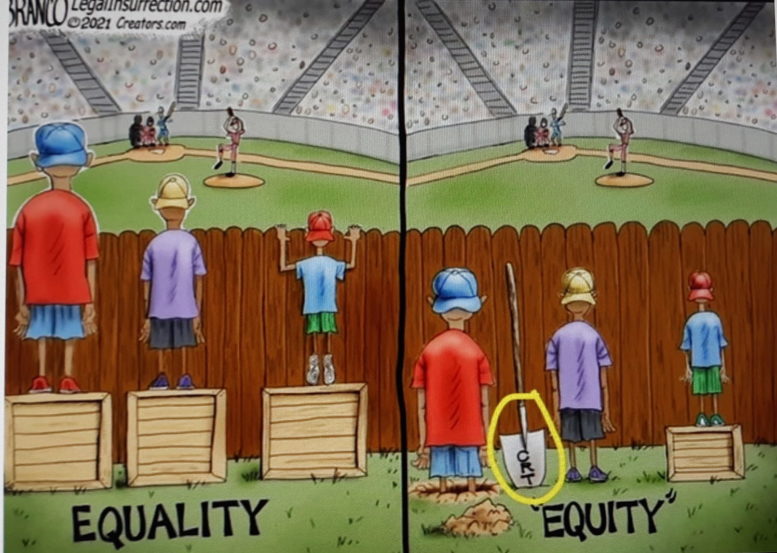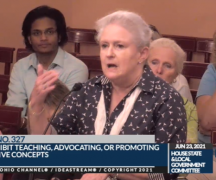By JAN LARSON McLAUGHLIN
BG Independent News
The woman elected to represent Wood County on the State Board of Education is convinced that schools and society are in peril due to efforts to condemn systemic racism and advance equity.
“This is very serious. This is an attack on Western civilization,” said Kirsten Hill, of Amherst, who spoke last month to a meeting of the Bowling Green Republican Club. “This would completely change America and the way you live.”
Hill voted against the Ohio school board’s anti-racism resolution that passed in 2020.
The resolution condemned “white supremacy culture,” spotlighted continuing academic performance gaps between races, and said “systemic inequity in education has relegated millions of children of color to under-resourced, struggling schools.”
As she talked with the local Republican Club, Hill advised citizens on how to make sure their school districts aren’t teaching concepts that brainwash children. She went as far as calling schools that aim for equity “indoctrination centers,” and advising that parents pull their children from those public schools.
Concerns about ‘equity’ in curriculum
Hill, who started her term on the state board in 2019, believes the concept of systemic racism is “unAmerican” and “infects the brains” of children.
“Don’t be bullied into thinking you’re racist,” she told her audience. “And for Blacks, don’t be bullied into thinking you’re a victim.”
She sees the practice of equity in education as a way of making white children feel guilty.
“We can’t have these divisive concepts in our schools,” Hill said.
She fears that efforts to address racism and equity in schools will result in educational standards being lowered. Students from so-called “oppressed” groups would be given special treatment, while “more advanced” students would be treated unfairly, she said.
Hill showed a slide reflecting her view on “equity.” The often used illustration for “equity” shows three people of varying height standing along a fence to see a ballgame – with boxes being added so all can see over the fence. But Hill presented a slide with her image of “equity” being a hole dug for the “more advanced” person along the fence, so that person could no longer see over the fence.
‘Code words’ for Critical Race Theory
In the past year, Critical Race Theory has become the “bogeyman” in classrooms for those opposed to education addressing racism.
The theory acknowledges the stark racial disparities that have persisted in the U.S. despite decades of civil rights reforms. It raises questions about how racist hierarchies are enforced, even among people with good intentions.
Despite claims that the theory is perverting K-12 education, the concept is not part of curriculum in Wood County schools, nor the vast majority of schools across the nation.
To many history and social studies teachers, discussing race in the classroom isn’t Critical Race Theory – it is history.
But Hill warned that schools are sneaking CRT into their curriculums. She told her audience to look for code words in school mission statements. Those words include: cultural awareness, anti-racist, racial sensitivity, implicit bias, inclusion, diversity, white privilege and white supremacy.
Social emotional learning is a gateway to CRT, Hill said.
“Even if you don’t have CRT, it will probably be showing up in the next year.”
Hill was also critical of “student-focused” learning, and she listed several examples of school districts across the country that have reduced their educational standards in order to achieve equity.
The state of Virginia got rid of algebra and geometry classes before 11th grade, she said. That, however, was a false story that a Fox News station started.
The state of Oregon got rid of standards for graduation, Hill said. That wasn’t accurate and had nothing to do with equity in schools. The state suspended its basic skills tests during the COVID pandemic.
And the Akron school system hired a consultant promoting equity in math classrooms, she said. The math education consultant was working to improve the accessibility and confidence of all students toward math.
Schools across the nation are pushing activism in the classroom, Hill said. She blamed the political leanings of college professors, who she said are “90% Left.”
She described visiting one elementary classroom in Oberlin, where students were divided in the classroom. Hill couldn’t remember the lesson involved, but said the students were “practicing demonstrating. They were too young to be doing that.”
What should parents do?
Several in her audience in Bowling Green asked what they can do to make sure their school districts aren’t teaching Critical Race Theory or other objectionable curriculum. Hill made the following suggestions:
- “Get your kids out,” of public schools if such curriculum is being taught. “They are indoctrination centers.”
- Train children to report back to parents about lessons involving racism.
- Work to elect at least three out of five school board members who are conservative.
- Attend school board meetings.
- Demand to see the district’s curriculum. Most school districts will drag their feet, she said, so parents need to keep asking. “They figure parents will tire.”
Hill advised that parents hold local school boards accountable, since the authority to determine curriculum rests with them.
“The local districts have the power,” she said.
But many school board members have been “brainwashed” by the state to follow Ohio curriculum guidelines, according to Hill.
“The Ohio School Board Association has trained them to stay in their own lane,” she said.
Hill said she was once asked “what’s so wrong with empathy,” in the classroom. She responded that before public schools began in the 1800s, moral education was the responsibility of families. When schools teach morals it divides students from their families.
“It’s bad, bad, bad,” she said.
Hill also cautioned parents to be watchful of the type of books their children read.
She told of a mother talking about her 9-year-old daughter being a voracious reader. The mother noticed that her daughter began speaking rudely to her – and blamed the type of books she was reading. So the mother developed her own books for her daughter to read.
Parents should examine the type of books in their school libraries, Hill said. They should also be more aware of public library offerings. Some story hours are “pornographic,” she said.

Who is Hill?
Hill was elected to represent Wood, Fulton, Lucas, Ottawa, Erie, Huron and Lorain counties on the state board of education. She opposed the board’s resolution for equity in education.
“I have been speaking on this topic openly and haven’t been canceled yet,” she told the Republican club, adding, “I do have a target on my back.”
She has testified in favor of House Bill 327, which threatens to cut funding for school districts that teach about systemic racism.
Hill said she is a leader of the Free Ohio Now organization, which opposed the state restrictions implemented to slow the spread of COVID-19. She is also critical of school districts for adopting mask mandates. “That is a whole other discussion,” she said.
She has been outspoken in her criticism of DeWine’s mandate that state employees attend training on implicit bias.
Hill organized a bus trip to the “Stop the Steal” event in Washington, D.C., on Jan. 6, when insurrectionists breached the U.S. Capitol. She said her participation in the event consisted of listening to President Trump’s speech, walking to the Capitol, praying at a street corner along the National Mall and waving an American flag.
Hill claimed there was “a small minority of individuals who appear to have broken the law by vandalizing the Capitol Building and personal property.”
State legislation in the works
Many argue that the true “patriotic” history of a great nation does not insist on focusing just on positives. An honest examination of the nation’s beginnings shows that the founders talked about equality – but many of their actions betrayed that goal.
But leaders against the practice of teaching about racism claim it pits different races against one another and creates “discomfort” for white students.
House Bill 322 would prohibit teaching certain current events and certain concepts regarding race and sex in public schools.
House Bill 327 would prohibit teaching, advocating, or promoting divisive concepts in school districts and state colleges. The bill threatens to cut funding for school districts that violate the prohibitions listed.
The bill also bans state agencies from offering instruction or training on divisive concepts – such as diversity training – to any employees, contractors, staff members, or any other individual or group or require them to adopt or believe in divisive concepts.
Because the Ohio Department of Education’s website includes a reference to the 1619 Project – a series published by the New York Times on slavery’s origins in American society – conservative members of the state board of education believe it’s likely being taught in schools. However, when asked recently by news media for specific examples of the concept being taught in schools, board members have not been able to identify any.
A different view
The Bowling Green League of Women Voters has invited the public to attend an Honesty in Education Forum on Wednesday, Sept. 8, from 7-8:30 p.m. via Zoom. The panel will include students, teachers, administrators and educational law experts.
The purpose of the forum is to examine the effect of HB 322 and 327 on Ohio’s schools, particularly with respect to the country’s history regarding racism, slavery, sexism, and other controversial topics. Ohioans want to know: What is currently being taught about these topics?
The outcome of these bills will be decided soon. This forum will explore how they would potentially impact the way history is being taught. The public is invited to review the bills here: https://www.legislature.ohio.gov/legislation/legislation-summary?id=GA134-HB-322http and https://www.legislature.ohio.gov/legislation/legislation-summary?id=GA134-HB-327
Panel members include:
- Todd Cramer, superintendent of Maumee City Schools
- Pat Pauken, attorney and educational law professor
- Ana Brown, deputy chief for Diversity, Belonging, Multicultural Affairs at BGSU
- Clayton Kalaf-Hughes, AP teacher at Bowling Green High School
- Ariana Bustos, student
- Ellie Boyle, student
- Cynthia Peeples, LWV Ohio
Everyone is welcome to attend this virtual event. Advance registration is required. Participants can register for this meeting using this link: https://us02web.zoom.us/meeting/register/tZMrc-ihqjosGNRtPHqghP2ASNPuWK5y4-a9




